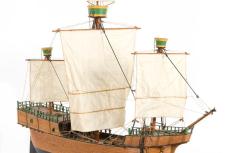Six 17th and 18th-century wrecks off Sweden identified
Maritime archaeologists from the Museum of Wrecks have recently explored and identified six shipwrecks on the sea floor in the Blekinge archipelago of Sweden. To protect the strategic naval city of Karlskrona and prevent attacks by sea, the ships had been sunk in the Djupasund strait.
It has been known for a long time that several old wrecks lay at the bottom of Djupasund between the islands of Tjurkö and Sturkö in the archipelago off the town of Karlskrona in South Sweden.
During the 1780s, a number of ships were deliberately scuttled to build a barrier at the entrance to Karlskrona. The wrecks are culturally important, but today, are invisible and inaccessible parts of the world heritage.
Several of the wrecks have become attractive dive sites but no one knew how many and what they were.
Identification
The Museum of Wrecks’ maritime archaeologists have finished their investigation and can now identify the wrecks: the giant ship of the line Enigheten (the third largest from the 17th century), Wasa, the frigate Södermanland, the pleasure craft Disa, the brigantine Pollux and the skerry boat Simpan.
These ships had long and intriguing histories before they ended up as underwater barriers to protect Karlskrona.

A multibeam sonar was used to survey the area, and six probable wrecks were found, in addition to some other historical remains. The survey combined with archaeological documentation, archive material and wood samples taken from the wrecks helped to figure out the ships’ most likely identities.
"With the aid of the survey, we were able to focus our archaeological efforts and document the wrecks more methodically," said Patrik Höglund, a maritime archaeologist at the Museum of Wrecks. "Instead of speculating about what’s hidden at the bottom, we can now use archaeological documentation to obtain facts about the wrecks in Djupasund."
Dive park
The identified wrecks will draw more visitors to the dive park, which is currently being planned in Karlskrona. "The museum has worked out a proposal for a dive trail, where divers can see various exciting details that can also tell us something about the ships," Höglund said.







































